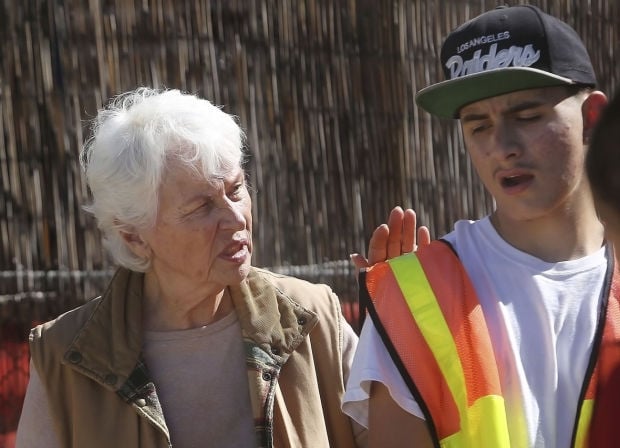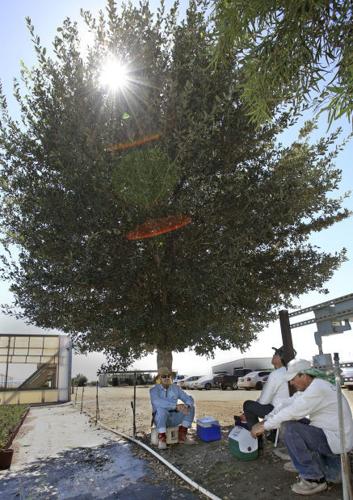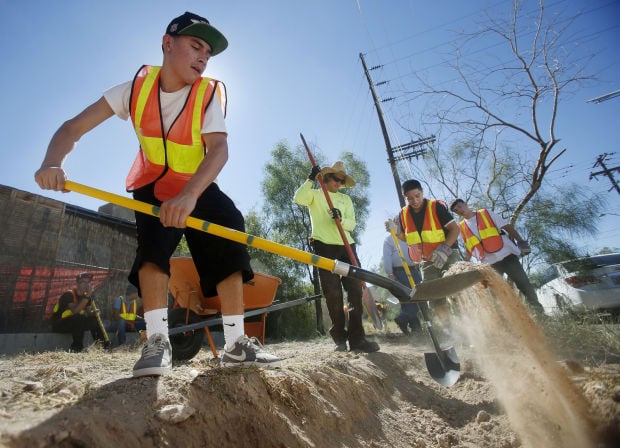The day Joan Lionetti started swiping Arizona Highways from her son’s orthodontist office in Old Lyme, Connecticut, was a good day for Tucson.
Before returning the magazine at subsequent appointments, Lionetti — now the 80-year-old executive director of the environmental nonprofit Tucson Clean and Beautiful — would pore over the pictures, enchanted by a beauty so unlike her East Coast upbringing. She decided to move to Arizona — and definitely not to Phoenix.
In 1978, she swapped tree-dense New England for the Sonoran Desert, where she would start the nation’s first program for recycling phone books, develop landscaping and vocational training for at-risk youth and spearhead the planting of more than 100,000 trees through her 25-year-old program, Trees for Tucson.
LIVING LEGACY
The Quercus fusiformis “Joan Lionetti,” a live oak tree bred by Civano Nursery specifically for the Southwest, will line streets and fill backyards with the story of Lionetti’s work for a greener Tucson.
The Shipley family at Civano Nursery began cultivating this new selection of oak tree about 12 years ago. When it came time to name the tree for its currently pending patent — around Lionetti’s 80th birthday in July — the family decided to honor their friend.
“I was flabbergasted, when I got a call from Les (Shipley) telling me that I was going to be patented,” Lionetti said, laughing in her Tucson Clean and Beautiful office. “Only a tree could get me patented.”
LIFE’S BRANCHES
When Lionetti moved to Tucson, her conservation conscience — first planted during a childhood spent at an Episcopal convent in Kingston, New York — flourished.
In love, she blames the nuns for everything.
“There was this ingrained ethic about caring about people and the environment and sharing all the time,” she said. “I mean, we didn’t wash our hair every day. We washed our hair once a week with Ivory soap. I still wash my hair with Ivory soap. And you ate all the food on your plate, and you didn’t waste.”
Lionetti doesn’t waste office furniture, and she doesn’t waste clothes. She shops secondhand, drawing on her experience in New England with the family antique business.
Raising her daughter and two sons first in Manhattan and then Connecticut, Lionetti passed on that frugal philosophy.
“She was a toilet paper Nazi,” said daughter Joanne Gerow, 56, by phone from Swan Lake, New York. “We were always taught as children to respect the environment. She was very fanatical about littering, and I can tell you that to this day, if I chew a piece of gum, the wrapper goes in my pocket.”
Lionetti’s off-the-grid, solar-powered home on 40 acres of land in Cochise County reflects that passion. She built it with life partner Thor Jorgensen, who died in 2008 and kept her “evergreen.”
“The desert is in her heart, and I don’t know why,” Gerow said. “It just is.”
SPROUTING SEEDS
Trees for Tucson begins with a tree cheer.
When Lionetti started the program in 1989, those first meetings began standing up, hands in the air waving like leaves with multiple shouts of “Trees! Trees! Trees!” said Greg McPherson, an original Trees for Tucson co-chair who is now a research forester with the U.S. Forest Service in Davis, California.
Friday at its annual meeting and dinner, Tucson Clean and Beautiful will celebrate 25 years of Trees for Tucson. As of Tuesday, the program had planted 102,570 trees, said program director Katie Gannon.
Trees for Tucson provides low-cost, drought-tolerant shade trees to customers of Tucson Electric Power and Trico Electric Cooperative, schools and community groups.
Lionetti started Trees for Tucson in affiliation with the American Forests Global ReLeaf campaign. The goal: Plant 500,000 trees by 1996. That was before they started digging into caliche, Lionetti said.
With similar programs sprouting nationwide and President George H.W. Bush’s America the Beautiful initiative, Lionetti found kindred spirits such as lifelong friend Suzanne Probart, the executive director of Tree New Mexico.
As Probart tells it, the friends bonded after a series of tree-related meetings, drinking a bottle of champagne at an indoor pool with a group one evening.
“There was some challenge ... something about jumping in the water,” Probart said by phone from Albuquerque about her race with Lionetti to kick off shoes and remove jewelry.
“I beat her, and we jumped in that pool together, ... and that was our defining moment. We talk about it still. It was like the baptism of our friendship. After that, we were best buddies. I challenged her, and you never challenge Joan.”
GROWING STRONG
Betsy Bolding, a friend and TEP manager of consumer affairs, occasionally likens Lionetti to a Gila monster: “She gets her teeth into it and won’t let go until she ends up successful.”
That zeal brought much to Tucson — recycling programs, commemorative tree parks to honor deceased loved ones and YARDS, the landscape and maintenance training program for at-risk youth in the Pima County Juvenile Court System.
Often acting as a go-between for government and bureaucracy to accomplish these and other programs, Lionetti envisions more: infrastructure planned with trees in mind, a city policy on replacing removed trees, and tree parks along The Loop.
She isn’t retiring yet.
“The first time I met her, I think I was running for office at the time,” said Mayor Jonathan Rothschild. “She came in, and everybody comes with a different approach, and her approach was, ‘Young man, this is something that is important, and when you get elected, I expect you to help.’ She wasn’t treating me differently than anyone else.”
In the last year, Roths-child has led a successful push to plant 10,000 trees in one year. Not too long ago, Lionetti said, she made him lead an elementary school assembly in the tree cheer.
Twenty-five years later, that cheer — like Lionetti and Trees for Tucson — still has oomph.
Mused Lionetti, “It’s amazing how when you start things, how they keep growing when they’re coming from the ground up, up from the community, not down, but up from the people.”






